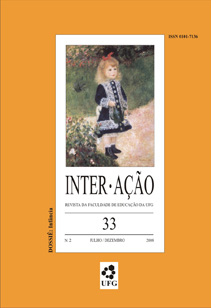Literacy in Children’s Education: “who’s afraid of the big,bad wolf.
DOI:
https://doi.org/10.5216/ia.v33i2.5267Abstract
This article is a reflection on literacy in children’s education, highlighting aspects of writing as a dynamic and active process in the social practices in which the child lives out their early years. For the under-fives in children’s institutions, it argues in favor of a pedagogical practice which is guided by the conceptions of education and care. These provide a contextualized dynamic with the principles of literacy, ignoring the mechanical repetitive practice with words and numbers, which was the traditional conception of literacy. Keywords: Children’s education. Literacy. Child.Downloads
Downloads
Published
How to Cite
Issue
Section
License
Inter-Ação uses the Creative Commons Attribution 4.0 License for Open Access Journals (Open Archives Initiative - OAI) as the basis for the transfer of rights. Open access means making documents available on the Internet free of charge, so that users can read, download, copy, distribute, print, search, or link to the full text of documents, process them for indexing, use them as input data for software programs, or use them for any other lawful purpose, without financial, legal, or technical barriers.
Authors publishing in this journal agree to the following conditions:
1) Authors retain copyright and grant the journal the right of first publication, with the work simultaneously licensed under the Creative Commons Attribution License, which permits redistribution of the work with attribution and first publication in this journal.
2) Authors are permitted to enter into additional, separate agreements for non-exclusive distribution of the version of the work published in this journal (e.g., for publication in an institutional repository or as a book chapter), with attribution and first publication in this journal.
3) Authors are permitted and encouraged to publish and distribute their work online (e.g. in institutional repositories or on their home page) at any time before or during the editorial process, as this may generate productive changes as well as increase the impact and citation of the published work.















